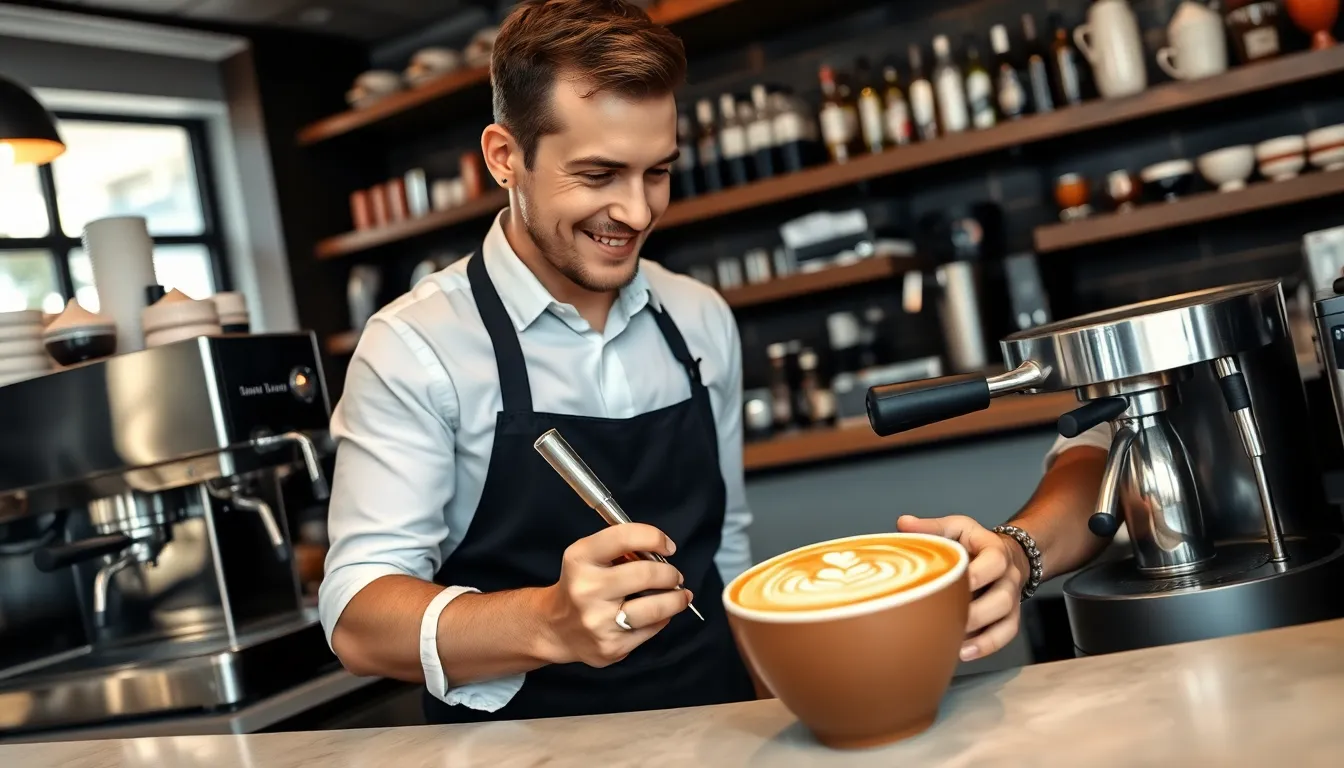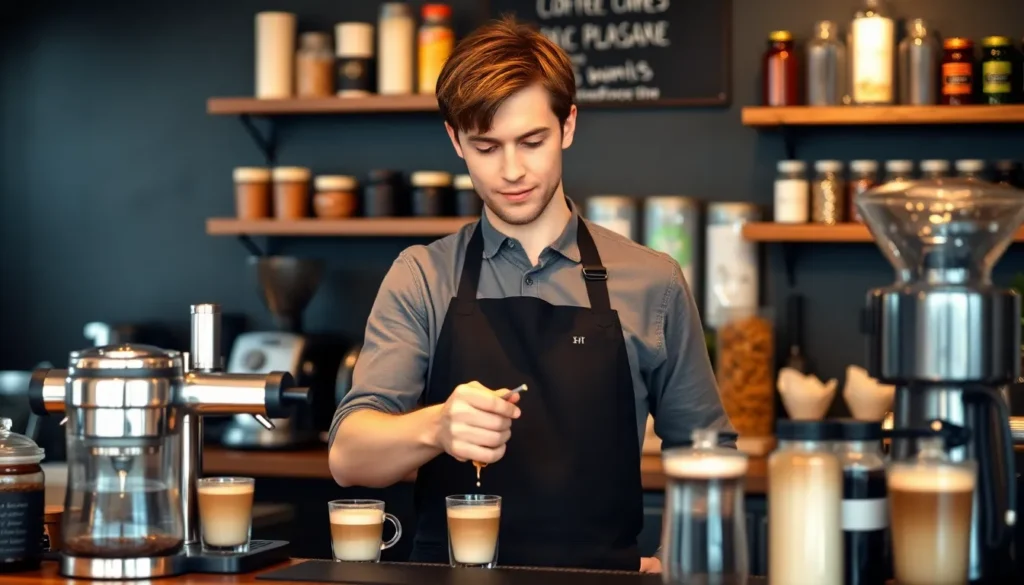In the vibrant world of coffee, barista skills are the secret ingredients that transform a simple cup into an extraordinary experience. Mastery of these skills not only enhances the flavor of each brew but also elevates the entire café atmosphere. From crafting the perfect espresso shot to creating intricate latte art, a skilled barista knows how to engage customers and make their coffee journey memorable.
As coffee culture continues to grow, the demand for skilled baristas has never been higher. Whether working in a bustling café or a cozy coffee shop, these professionals blend technique with creativity, ensuring every cup is a work of art. Understanding the essential barista skills can open doors to exciting career opportunities and foster a deeper appreciation for the craft of coffee-making.
Table of Contents
ToggleOverview of Barista Skills
Barista skills encompass a range of techniques and knowledge essential for crafting quality coffee beverages. Proficient baristas possess the ability to brew various coffee types, such as espresso, pour-over, and French press, ensuring optimal flavor extraction. Additionally, understanding coffee bean varieties, regions, and processing methods enhances their overall expertise.
Baristas excel in milk frothing and texturing, allowing them to create latte art. This skill not only beautifies drinks but also showcases the barista’s artistic abilities. Knowledge of brewing equipment, including espresso machines and grinders, contributes to efficient and consistent drink preparation.
Customer service skills play a vital role in the barista experience. Engaging with customers, taking orders accurately, and maintaining a friendly demeanor fosters a welcoming environment. Baristas also receive training in health and safety protocols to ensure cleanliness and hygiene in the workplace.
Time management is crucial, especially during peak hours. Baristas must balance multiple tasks while maintaining the quality of each drink. Adaptability is equally important, enabling them to adjust techniques based on customer preferences or equipment issues.
Continual learning about coffee trends and brewing innovations further enriches a barista’s skill set. Networking with other coffee enthusiasts and participating in workshops or competitions enhances both knowledge and practical experience.
Essential Barista Skills

Baristas must master various skills to elevate the coffee experience. Essential skills include coffee brewing techniques, espresso preparation, and milk frothing and texturing.
Coffee Brewing Techniques
Baristas must understand multiple coffee brewing techniques to ensure optimal flavor extraction. Techniques include:
- Espresso: Requires precise measurement and tamping of coffee grounds for rich flavor.
- Pour-Over: Involves manual control of water flow, enhancing the brew’s nuances.
- French Press: Utilizes steeping, allowing coffee grounds to infuse fully for a robust taste.
- AeroPress: Combines elements from different brewing methods, providing versatility.
- Cold Brew: Steeped in cold water for an extended period, producing a smooth, less acidic coffee.
Espresso Preparation
Espresso preparation demands precise skills for consistency and quality. Key aspects include:
- Grind Size: Adjusting grind size influences extraction time and flavor profile.
- Tamping: Evenly compacting coffee grounds ensures uniform extraction during brewing.
- Timing: Monitoring extraction time allows for optimal flavor and crema development.
- Water Temperature: Maintaining 195°F to 205°F prevents over-extraction or sour flavors.
- Equipment Maintenance: Regular cleaning of espresso machines and grinders guarantees quality outputs.
Milk Frothing and Texturing
- Steam Wand Technique: Controlling steam pressure and angle promotes microfoam creation.
- Temperature Control: Heating milk to 140°F to 160°F enhances sweetness without scalding.
- Latte Art: Mastering pouring techniques creates designs, showcasing barista creativity.
- Milk Selection: Understanding different milk types affects texture and flavor in beverages.
- Consistency: Consistent frothing leads to a creamy mouthfeel and rich texture in drinks.
Customer Service Skills
Customer service skills play a vital role in a barista’s ability to deliver an exceptional coffee experience. Strong customer interaction fosters loyalty and satisfaction among patrons.
Communication and Interaction
Effective communication boosts customer relations. Baristas must greet customers warmly, listen to their preferences, and provide recommendations based on their tastes. Clear articulation of menu items and ongoing dialogue ensures that orders are accurate and expectations are met. Active listening empowers baristas to address inquiries and concerns promptly, paving the way for a pleasant experience. Additionally, body language, eye contact, and a positive demeanor significantly contribute to creating an inviting atmosphere.
Problem-Solving
Problem-solving abilities are crucial in a fast-paced environment. Baristas often encounter issues such as equipment malfunctions, incorrect orders, or customer complaints. Quickly identifying the problem, assessing the situation, and implementing a solution is essential for maintaining service quality. For instance, if a machine breaks down, a barista must communicate the delay effectively while offering alternatives to keep customers satisfied. Flexibility in adjusting to unexpected challenges strengthens a barista’s ability to meet customer needs while ensuring minimal disruption to service.
Advanced Barista Skills
Advanced skills elevate a barista from proficient to exceptional. Mastery of latte art and flavor profiling profoundly enhances the overall coffee experience.
Latte Art
Latte art requires precision and creativity. Baristas create intricate designs by controlling milk frothing techniques and pouring methods. Key techniques include:
- Steam Wand Control: Mastery of the steam wand leads to velvety microfoam essential for latte art.
- Pouring Techniques: Understanding pouring angles and speeds allows baristas to produce hearts, rosettas, or tulips in a latte.
- Milk Selection: Different milk types impact foam stability and texture. Whole milk versus alternatives like almond or oat creates varying results.
- Temperature Management: Ideal milk temperature ensures optimal foam without scalding, preserving flavor integrity.
Perfecting latte art not only showcases a barista’s artistic flair but also enhances the customer’s enjoyment.
Flavor Profiling
Flavor profiling involves a deep understanding of coffee’s nuances. Skilled baristas identify and articulate the flavor characteristics of various coffee beans through:
- Tasting: Regular cupping sessions allow baristas to discern subtle notes in coffee, like fruitiness or nuttiness.
- Brewing Variables: Baristas adjust grind size, water temperature, and brewing time to optimize flavor extraction for specific coffee types.
- Origin Knowledge: Familiarity with coffee origins helps baristas pair beans with appropriate brewing methods, enhancing unique flavor profiles.
- Customer Education: Engaging patrons in discussions about flavor profiles fosters appreciation and loyalty.
Developing flavor profiling skills enriches the barista’s expertise and cultivates a deeper connection with coffee enthusiasts.
Continuous Learning and Development
Continuous learning is vital for baristas aiming to excel in their craft. Engaging in professional development ensures baristas remain current with industry trends, techniques, and innovations.
Training Programs and Workshops
Training programs and workshops provide valuable hands-on experience. Participating in specialized courses enhances baristas’ technical skills and knowledge of coffee varieties and brewing methods. Many coffee roasters and industry organizations offer workshops, exposing baristas to advanced brewing techniques and flavor profiling.
Coffee Competitions
Coffee competitions serve as excellent platforms for skill advancement. Competitive events challenge baristas to refine their techniques and showcase their creativity. Participating in such competitions allows baristas to learn from peers, gain insights from judges, and stay motivated to improve their craft.
Networking Opportunities
Networking with fellow coffee professionals plays a crucial role in continuous learning. Engaging with peers at coffee festivals, trade shows, and local coffee events fosters collaboration and information sharing. Building relationships within the coffee community leads to knowledge exchange about equipment, brewing methods, and customer service tactics.
Online Resources and Courses
Online resources and courses offer baristas an accessible way to expand their skills. Many reputable websites and platforms provide educational content on barista techniques, coffee science, and customer service strategies. Participating in these courses enables baristas to learn at their own pace and incorporate new knowledge into their daily practice.
Feedback and Self-Reflection
Seeking feedback from customers and colleagues encourages growth. Constructive criticism helps baristas identify areas for improvement and develop new strategies. Regular self-reflection promotes personal growth and skill enhancement, allowing baristas to assess their performance and set goals for continuous improvement.
Embracing continuous learning and development empowers baristas to refine their skills, enhance the coffee experience, and keep pace with an evolving industry.
Mastering barista skills is essential for anyone looking to thrive in the coffee industry. These skills not only elevate the quality of coffee but also create memorable experiences for customers. As the coffee culture continues to grow, the demand for skilled baristas will only increase.
Embracing continuous learning and honing techniques can lead to exciting career opportunities. Whether it’s perfecting brewing methods or engaging with customers, every aspect contributes to a barista’s success. By investing time and effort into developing these skills, baristas can truly transform their craft and foster a deeper connection with coffee enthusiasts.








